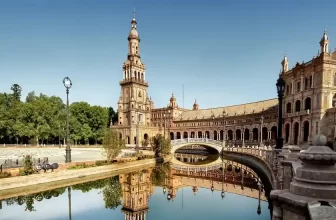
The first thing that hit me when I stepped out of Bilbao Airport wasn’t the language or the architecture-it was the smell. Earthy, fresh, like it had just rained (because honestly, it probably had). And then came the sight of rolling hills wearing a green so loud it almost looked edited. The clouds hung low, the mountains hugged the city, and there it was: Bilbao.
Stepping into the city was sensory overload-in a good way. Pintxos bars buzzing, narrow streets with trolley tracks under my feet, and students spilling out of corner cafés in every direction.
By the time I reached my new flat in Deusto, my anxiety had mostly melted into this mix of “wow” and “holy crap, I live here now.”
If you’re getting ready for 2026, this study guide in Bilbao is what I wish someone had handed me before I booked my flight. No fluff. No gloss. Just the real stuff students care about-cost of living, what it’s like to live here, how Uni works, and how to not overpay for a monthly metro card.
Let’s get into it.
Why Study in Bilbao in 2026?
Everyone talks about Barcelona. Everyone fantasizes about Madrid. But Bilbao? That’s the quiet powerhouse. And 2026? It’s looking like a smart move.
Key Reasons 2026 Is a Great Year to Study in Bilbao
- Spain had over 220,000 international students in 2025, and Basque Country’s share is growing thanks to research recruitment and Erasmus+ partnerships.
- The ongoing EU funding push toward green energy, finance, and smart mobility has made Bilbao a magnet for graduate students in sustainability, engineering, and economics.
- You get the charm of a smaller city-but still access excellent international degree programs in English.
- Spain continues to offer reasonable visa terms, affordable tuition, and low living costs-especially in Bilbao compared to Madrid or Barcelona.
Tuition ranges? Around €900–€3,000 per year for public universities for non-EU students. Yes, really.
Academic and Career Value
- With new policies around post-graduate employment across the EU, you’ll have a real shot at staying after graduation and finding work.
- Multiple bilingual and trilingual degrees.
- Access to city-wide research centers and clusters in green engineering, digital health, and cultural interaction studies.
Studying abroad isn’t just about what you learn in the classroom-it’s about who you become when you leave it behind. You’ll grow here. Quickly. And weirdly, in a way that sticks.
Why Bilbao Is So Underrated for International Students
I won’t sugarcoat it-Bilbao isn’t a massive tourist magnet, and that’s actually the best part.
Student Population & Diversity
- University of Deusto, UPV/EHU, and Mondragon Unibertsitatea bring in over 15,000+ students to Greater Bilbao yearly.
- You’ll find Erasmus and full-degree students from Morocco, India, Brazil, Japan, Ghana, Turkey, Colombia, and all over Europe.
- Most campuses offer language exchange programs, student societies, and tutor/mentor matching programs to support your transition.
My flatmate was from Cairo, and we joined this tandem language café within our first week. He barely spoke Spanish; I barely spoke Arabic. But by mid-semester, we could talk for hours in a mix of English and second languages-which is exactly how it’s supposed to be.
Support That Isn’t Just There for Show
Most faculties have:
- Dedicated international coordinators
- Visa renewal and NIE (residency number) help desks
- Step-by-step guides for healthcare, public registration (empadronamiento), and even help opening your bank account
From what I’ve seen, Bilbao is more student-friendly than tourist-friendly-and that matters.
Career Connections to Keep on Your Radar
- BBVA, Iberdrola, Petronor/Repsol, CAF, and DeustoTech are all headquartered or active around Bilbao
- Internship opportunities in sustainable finance, supply chain, renewables, and UX design are showing up more often
- Erasmus Traineeship programs and post-study work schemes are rising, at least through 2026 reforms
One friend of mine landed a UX design placement while learning Spanish on the side. B2 level helped-but not required. Their boss even encouraged using ChatGPT and AI tools to support tasks.
Top Universities and Colleges in Bilbao
Let’s break down the ones that matter, especially for international students setting up a life in Bilbao.
University of Deusto (Universidad de Deusto)
- Private university with historic reputation
- Ranking: Top 30 in Spain; major player in international cooperation & humanities
- Specialties: Business, Human Rights, Psychology, Engineering, International Relations
- Tuition: ~€4,000–€8,000/year for international programs
- Vibe: Highly international, small class sizes, modern digital systems
- Location: Right across the river from the Guggenheim. Yes, the view is stunning.
University of the Basque Country (UPV/EHU)
- Public university
- Nationally ranked, strong research output
- Specialties: Engineering, Medicine, Environmental Science, Law, Visual Arts
- Tuition: €900–€3,000/year for non-EU students
- Known for: Bilingual coursework (Spanish/Basque) and steady EU research funding
- Vibe: Academically solid, more local students, workshops-led
Mondragon Unibertsitatea (Bilbao Campus)
- Practical and employment-focused
- Courses in Engineering, Cooperative Management, Entrepreneurship
- Tuition: €3,000–€5,000
- Ideal if you want project-based learning + startup culture
IED Kunsthal Bilbao (Design School)
- Brand-new energy, creative student body
- Tuition is high (~€8,500+), but strong placement in fashion + visual media sectors
- Cool fact: Some projects go straight into real exhibitions. So it’s not “theory only” stuff.
Top Student Accommodation Options in Bilbao
Finding student housing in Bilbao in 2026 is definitely not London-level stressful, but it’s also not plug-and-play. You need to start early, especially if you’re eyeing something near the universities or the city center.
Let’s break it down.
Colegio Mayor Deusto
- University-affiliated dorm (Deusto)
- Monthly cost: €600–€900 (includes meals + cleaning)
- Pros: Right next to the university. Full-board. Super safe.
- Cons: Traditional dorms-shared rooms, strict curfews in some cases
- Pro tip: Apply early-these are competitive and usually require an interview.
Livensa Living (Private Student Residence)
- 10-minute walk from multiple universities
- Cost: €800–€1,100/month for a studio with gym, laundry, co-working space
- For students who like sleek, modern spaces
- Bonus: Community events, house movie nights, and no hidden bills
Shared Flats (Pisos Compartidos)
- Most students go for shared flats in neighborhoods like Deusto, San Ignacio, or Casco Viejo
- Cost: €350–€550/month for a room
- Search on Idealista, Fotocasa, or local Erasmus/Whatsapp groups
- Some apartments don’t include utilities-add €50/month average
Homestays
- Less common, but great for improving Spanish and adjusting quickly
- Around €400–€500/month with breakfast or two meals a day
- Best arranged through university platforms or homestay Spain agencies
✅ Booking tip: Schedule an in-person or video call before signing. Some landlords still prefer cash rent, some will want NIE or proof of study-so read before you pay.
Neighborhoods Students Love in Bilbao
Looking for the best neighborhoods for students in Bilbao? Start here. It really makes or breaks your daily routine.
Deusto
- Right by Deusto University
- Walkable to class, lots of cafes, some really affordable tapas bars
- Rent: €400–€550/month for a room
- Downside? It can feel too student-heavy at times
Indautxu
- Trendier part of the city
- Access to everything-bars, parks, metro, gyms
- Rent: €500–€650/month
- More mid-to-upper-range, lots of shared flats with students and young professionals
- Feels like a mix of academics and locals
Casco Viejo (Old Town)
- Gorgeous old buildings, nightlife, boho vibe
- Rent: €400–€550/month
- Very attractive neighborhood for exchange students or creatives
- Noise could be an issue, depending on the street you’re on
Santutxu / San Ignacio
- More residential
- Further from city center (15–20 min by metro)
- Rent: €300–€420/month
- Calmer, more family-oriented
- Great for introverts or those working part-time or remotely
🚎 Transport bonus: All these neighborhoods have great metro or tram links, and most students grab a Barik card for public transport discounts. More on that next…
Cost of Living in Bilbao: Real Student Budget Breakdown
Here’s something no university will tell you: you can absolutely live in Bilbao as a student for under €900/month-but you’ll have to budget smart.
| Category | Low (€) | Average (€) | High (€) |
| Rent (Shared Room) | 350 | 450 | 650+ |
| Groceries/Food | 120 | 180 | 220 |
| Transport (Monthly Barik) | 27 | 27 | 40 |
| Mobile + WiFi | 25 | 35 | 50 |
| Social/Leisure/Nightlife | 50 | 100 | 150+ |
| Gym/Health Insurance | 15 | 30 | 60 |
| Total/month (€) | ~650 | ~850 | ~1,200 |
Budget-Friendly Tips & Tricks:
- Eat where locals eat: menú del día lunches for €12 = gold
- Mercadona and Eroski for groceries-WAY cheaper than Carrefour
- Use the Deusto student canteen (mensa) – €5 for a full hot meal
- “Pintxo pote” = happy hour with drink + snack for €2 or €3
Scholarships and Financial Aid
Yes, Spain does offer scholarships for international students-but the system isn’t always easy to navigate.
Let’s simplify things.
Government & EU-based Scholarships
- Erasmus+ Grants: If your home university is a partner
- MEFP Scholarship (Spain Ministry of Education): Can apply once you’re in-country long-term
- UE partnerships: Some students from Latin America or Africa qualify under bilateral aid agreements
University-Specific Funding
University of Deusto
- Offers partial scholarships for master’s and PhD programs
- Also has scholarships based on financial need + merit
UPV/EHU
- Grants for students from developing countries
- May waive part of tuition upon application
Application Tips:
- Start early. Like February at the latest.
- Get your documents translated and legalized before applying.
- Talk to the International Office for lesser-known regional bursaries-they’re golden.
Step-by-Step: Applying to Study in Bilbao (2026 Intake)
Here’s a simplified roadmap for applying to universities in Bilbao (public or private), based on what students actually go through:
1. Shortlist Your Programs (Oct–Dec 2025)
Use UniCompare, Erasmus+ lists, or the university’s official site. Focus on program language, entry criteria, and scholarship eligibility.
2. Gather Documents (by Jan 2026)
Including:
- Passport copy
- High school/uni transcripts
- Statement of Purpose (SOP)
- Reference letters
- Proof of language proficiency (IELTS/DELE)
3. Submit Applications (Jan–March 2026)
Postgrad = via university’s online platform
Undergrad = via Spain’s UNEDasiss or directly
Normal fee: ~€40 per program
4. Wait for Offers / Apply for Scholarships
(March–May offers roll in)
5. Confirm Enrollment and Pay Deposit
Usually ~€500–€1,000 for international students
6. Apply for Visa (June–July 2026)
More below on that!
Student Visa and Work Rules in Spain (2026)
Don’t panic. It’s a lot of boxes to tick, but once you understand the flow, it’s manageable.
Documents You’ll Need:
- University acceptance letter
- Proof of accommodation
- Proof of funds (~€7,200/year minimum)
- Health insurance covering your stay
- Clean criminal record + passport
- Visa application form + appointment with the consulate
Processing Time
- About 30–45 days
- Apply ideally by June so you make it to welcome week
Work Rules for International Students
- Work 20 hours/week max during term
- You’ll need a work authorization from your uni or employer
- After graduation, students can extend their stay by applying for a “stay for job search” permit (valid 12 months)
Public Transport in Bilbao: You Won’t Need a Car
Honestly? Bilbao crushes it in the student transport department.
Your Tools:
- Barik Card: Rechargeable smart card for all metro, buses, and trams
- Monthly unlimited plan (ages 18–25): Just €27/month
- Metro runs every 6 minutes. Clean. Safe. Punctual.
- City bikes + scooters (Lime) are everywhere, especially around Deusto and Moyua
- Tram is underrated-especially if you live in San Ignacio or Zurbaran
✅ Pro tip: Download Bizkaibus app + Bilbobus for updates on routes, delays, and routes during fiestas.
Student Life, Food, and those “Oh wow, I live here” Moments
A Typical Day:
9:30 AM – Coffee & croissant for €1.80 at Tartanga Café
10:00 AM – Lecture near the river (switching between English + Spanish slides)
1:00 PM – Menú del día with your classmates (fish, bread, bottle of water)
4:00 PM – Library nap or language tandem Meetup
10:00 PM – Pintxos at La Viña or +1 to whatever’s happening in Casco Viejo
Food Culture
- Pintxos every Thursday
- Basque food = hearty and often dairy-heavy
- Vegetarians and halal options are expanding, but always double check labels (especially for meat/gelatin)
Social Scene
- Student nights at Bilborock and Kafé Antzokia
- Erasmus + Uni societies host Tandem Language Nights, hiking trips, museum passes
- Prepare to fall in love with cider… and tortilla española
What Might Surprise You
- The Basque identity is strong-they speak both Spanish and Euskara (Basque)
- Nightlife = late. Some clubs don’t fill until 2AM
- Group projects are a thing. Spanish unis love collaboration, so come prepared
Short-Term Study Abroad in Bilbao
Not ready to commit to a full 3- or 4-year degree? No shame in that. Bilbao has flexible short-term study options that let you test the waters without diving in too deep.
Erasmus and Exchange Programs
If your home uni is part of Erasmus+, you can apply for a semester or full year exchange at:
- University of Deusto
- UPV/EHU
- Mondragon Unibertsitatea
Most courses are available in English, Spanish, or Basque, and credits transfer easily through ECTS.
Summer and Winter Schools
- Deusto Summer School offers 2–4 week programs in Human Rights, Innovation, European politics, and Business.
- UPV/EHU’s Uda Ikastaroak (summer courses) are open to international students and cover topics from STEM to sustainability.
Tuition for short-term programs: ~€300–€700 (some include housing and food)
Who’s This Good For?
- Students hunting extra credits or language immersion time
- Applicants prepping to get a feel for Spain before committing long-term
- Gap year folks or summer travelers
2026 Application Timeline (What to Do, Month-by-Month)
Here’s your realistic application timeline. Save it, screenshot it-whatever works.
| Month | What to Do |
| Oct–Dec 2025 | Research programs, shortlist unis |
| Jan–Feb 2026 | Prepare application documents, translate any transcripts |
| Feb–Mar | Submit applications for degrees + most scholarships |
| Apr–May | Apply for accommodation + confirm admission |
| Jun–July | Apply for student visa + residence permit paperwork |
| Aug | Book flights, pack, join local Whatsapp/Telegram student groups |
| Sept 2026 | Arrive in Bilbao, find your new crew, grab your Barik card |
Public vs Private Universities: What You Need to Know
Let’s keep it simple and real-both public and private universities in Bilbao have solid reputations, but they serve different types of students.
| Factor | Public (UPV/EHU) | Private (Deusto, Mondragon) |
| Tuition Fees | €900–€3,000/year | €3,000–€9,000/year |
| Language of Instruction | Mostly Spanish or Basque | English-taught programs growing |
| Admissions Process | Slightly more bureaucratic | More support and faster response |
| Research Focus | Strong in STEM/Health | Strong in Business/IR/Design |
| Scholarships | Available, not well-publicized | Numerous, especially for need-based |
| Campus Vibe | Local Spanish student culture | International, smaller cohorts |
Summary – Why You Should Study in Bilbao
Study in Bilbao, and you’re signing up for more than a degree. You’re joining a city that values education, celebrates diversity, and thrives on culture. It’s where you exchange ideas over pintxos, find creative inspiration in the Guggenheim’s shadow, and make friends on a beach hike… all while attending top-tier classes in internationally respected institutions.
This isn’t just Spain, it’s Basque Country. It moves to its own rhythm. And it just might be the perfect beat for you.
Top 10 FAQs About Studying in Bilbao
Yes. It’s one of Spain’s safest cities, especially in student neighborhoods.
Absolutely. Many universities offer English-taught bachelor and master programs.
Anywhere from €700–€1,200/month, depending on your lifestyle and housing.
Yes. EU students can work freely. Non-EU students can work up to 20 hours/week with a permit.
It can be competitive, start 3–4 months early. Check with official university housing first.
Not a must, but helpful. English can take you far, especially in academia.
Social, active, and diverse. From music festivals to hiking groups, there’s a place for everyone.
Mild oceanic climate. Wet winters, sunny springs, and cool summers. Layers work wonders.
Contact your nearest Spanish consulate after university acceptance. Expect 4–8 weeks for processing.
Smaller crowds, lower costs, multicultural vibes, strong community, and oh, beaches and mountains nearby.






